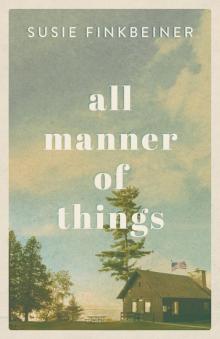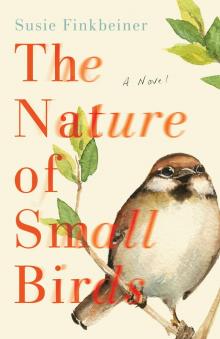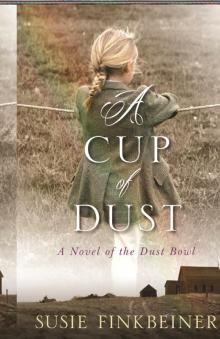- Home
- Susie Finkbeiner
The Nature of Small Birds Page 6
The Nature of Small Birds Read online
Page 6
“Thanks, buddy.”
“You better get a piece of cake before your dad eats it all,” he says. “Looks like he’s getting thirds already.”
I glance over just in time to see Linda plop another serving on Dad’s plate and him putting his finger to his lips when he catches me watching.
As if I’d tattle on him. The man deserves all the cake he can get into him.
After we leave the facility to let Mom rest, everybody comes over to our place for a bonfire. It’s probably the last one we’ll have all year. It’s a bittersweet realization.
Evie sits on my lap, the fire warming both of us against the chilly night. She’s got chocolate and marshmallow stuck to her face from a couple too many s’mores. I know it’s more than she should have had—especially after cake and ice cream earlier—but when she asks as nicely as she did, I have a hard time saying no.
“Grandpa?” she asks.
“Yeah?” I say, picking a couple crumbs of graham cracker out of her white-blonde hair.
“Who’s that boy with Aunt Holly?” She scrunches up her face. “I saw her kiss him.”
“Oh, gross.” I grimace.
“It was really gross.”
“I imagine it was.” I squint my eyes. “Would you believe that’s her boyfriend?”
“I guess.” She leans forward and glares across the fire at Holly. “Are they gonna get married?”
“Maybe.” I put my hand on the top of Evie’s head. “That okay with you, squirt?”
“Only if they don’t kiss at the end.”
She leans back into me and opens her mouth with a long yawn.
“Grandpa?” she asks again.
“What’s up?”
“Why’s Aunt Holly so much younger than Mommy and Aunt Mindy?” She rubs her eye.
“Well, we thought we were done having kids,” I say. “Then Aunt Holly surprised us.”
“How?”
“Huh.” I squint my eyes at her. And then, trying to change the subject, “What do you want for Christmas?”
“Oh. Aunt Holly surprised you in a grown-up way,” Evie says. “I guess I don’t want to know anyway.”
“Whew.” I run a hand across my forehead, wiping away imaginary sweat.
“Faith knows about grown-up things.” Evie wrinkles her nose. “Mom told her. She said it’s kind of gross.”
“Well, I don’t know about that.”
She shifts her weight and then lies back so that I’m cradling her. It won’t be long until she’s far too big for this. She’s darn well near that point now. I know my arm’s going to start tingling soon. I don’t mind too much.
“Grandpa?”
“That’s me.”
“I miss Uncle Eric,” she says. “Don’t tell Aunt Mindy.”
“It’ll be between you and me.” I wink at her.
She winks back.
The truth is, as much as I’d like to kick the guy for breaking my daughter’s heart, there are moments when I miss Eric too. A man can’t spend twenty-five years in a family and go without being missed once he’s gone.
Evie’s breathing deepens and slows. I can’t help but smile. My word, she looks like her mama. I draw her up closer to me and wonder how she can sleep with so much sugar in her bloodstream.
Mindy circumvents the fire to stand beside me. Looking down at the snoozing Evie, she puts a hand to her chest and lifts her eyebrows as if to say “how cute.”
“You okay?” she asks, whispering. “You want me to take her inside?”
I shake my head. “I got her.”
She pulls a camp chair close to me and sits, rubbing her hands near the fire.
“That was a nice present you gave Grammy,” I say.
“Oh, it was nothing.” She shrugs.
“I thought it was the best thing she got today.” I watch the fire for a couple of minutes, mesmerized by the movement of the flames. “Your grandmother . . .”
I stop myself and put a hand over Evie’s ear so she can’t hear what I’m about to say, even if she is sleeping. It’s another of those grown-up things that she’s not quite ready to understand yet.
“She wasn’t always like this,” I say, trying my best at an apologetic smile.
“I know.” Mindy pulls the sleeves of her sweatshirt down past her knuckles. “It’s all right.”
“What’s not all right is that you get the brunt of it.”
“I’m sort of used to it.” She gives a slight shake of the head. “It doesn’t bother me as much as it used to.”
“You know it’s less about you and more about her, don’t you?”
“Yeah.”
“She wasn’t like this before.”
“Before what?” Mindy asks.
“Before my brother died.” I swallow hard, the sting of losing Dale still as sharp as ever. “It’s no excuse, though.”
“I know.”
“I’ve let her get away with it so long,” I say. “Too long.”
“It’s all right.” She blinks hard. “Seriously, it is.”
If it weren’t for this pit in my throat, I’d tell Mindy that it isn’t all right. Not by a long shot. And it’s not fair that my mother has put the full weight of her deepest grief squarely on her shoulders.
I’ll never know whose fault it is that my brother died. What I do know, though, is that it wasn’t Mindy’s.
I want so badly to apologize for tiptoeing around Mom’s behavior toward my daughter. We all have. And it’s not right. Not even a little.
But before I open my mouth to say I’m sorry, Mindy grabs my hand that’s been covering Evie’s ear.
“I think you’re smushing her,” she says with a smile.
Evie nuzzles into me and I glance down, catching her sneak a peek at me with one eye.
She’s faking and I don’t mind one bit.
CHAPTER
Eight
Linda, 1975
The little TV that we kept in the corner of the living room was nearly as old as I was. A castoff from Hilda and Ivan, it only got two stations—three if we pointed the antennae just right. Black and white and all kinds of fuzzy, the picture left much to be desired.
Usually it was fine. The only program we watched with much regularity was the news anyway. Well, and sometimes we’d try for PBS so Sonny could catch Mister Rogers’ Neighborhood.
It was the cutest thing when she’d see him on the screen. She’d clap her little hands and call him “my friend.” If her idea of a friend was what she saw in Fred Rogers, I had all the confidence in the world that she would grow up to be a happy person.
Bruce moved the rabbit ears from one position to the next, adjusting the aluminum foil we’d wrapped around the ends, trying his hardest to get reception so we could watch the news.
“Come on,” he said under his breath, as if hoping to convince the antennae to give us a clear picture.
“There, there, there,” I said, nearly yelling, once the static cleared. “Perfect.”
I patted the floor beside me so Bruce would sit close to me. He sat cross-legged and his knee rested against mine, and I thought it a wonder that being so near to him could still make a pleasant flutter in my tummy.
Dan Rather was in for Walter Cronkite that evening, and I was a tad disappointed. Cronkite was my favorite.
“Good evening,” Dan Rather said. “South Vietnam is now under Communist control.”
Bruce let out a soft groan and hung his head. I covered my mouth with my hands and leaned forward, my elbows resting on my thighs.
For ten years all we’d heard from our government was that we, as a nation, had the obligation to keep South Vietnam out of the hands of the North. That was why we spent hundreds of billions—billions—of dollars fighting that war. And it was why we sent millions of our soldiers—most of them still boys—over there.
Too many came back with wounds that had cut far deeper than skin and muscle and bone. Like Chris.
Far too many never made it back at all. L
ike Bruce’s brother Dale.
Still, despite all of that, the Communists came riding into Saigon on their tanks to accept the surrender of the South Vietnamese. The flag of North Vietnam flew over the presidential palace.
It was over.
Just like that.
I felt sick to my stomach.
I’d spent most of my adult life praying that the war would end. I protested and wrote songs about peace that I sang in smoky coffee shops to rooms full of hippies that all agreed with me.
It felt like I was really doing something.
Hogwash. That was what all my efforts had amounted to. In all that time I hadn’t done a single thing to change the world like I’d hoped I could. All I’d accomplished was the making of much noise.
Through the muddy reception of the television, we watched folks running across a rooftop to the open back of a cargo helicopter. We saw the fleet of row boats in the South China Sea, Vietnamese families fleeing somewhere, anywhere they could find safety for just a little while, hoping to end up in a more peaceful place.
“Will they let them come here?” I asked.
“I don’t know,” Bruce answered.
The scene changed, showing buses with people standing close together, all trying to get on board. A reporter’s voice came through the speaker sounding garbled, nearly indecipherable. But one image was clear as could be.
A little boy—I guessed just about two or three years old—traveled along above the heads of the crowd, passed from hand to hand toward one of the buses. He had on a little baseball cap, T-shirt, and shorts. He hardly moved, didn’t seem to make a sound as he was pulled up and through a window.
But what about his family? Where were they?
“Families separated . . .” came through. “. . . pleading not to be left behind.”
My heart ached.
Helicopters that had just airlifted evacuees were shoved off the side of an airlift carrier. A few others crash landed into the sea, the pilots jumping out, swimming to safety.
It surprised me how long the helicopters bobbed on top of the water before resigning to sink to the bottom of the ocean.
“Why would they do that?” I asked, shaking my head.
“I don’t know,” Bruce answered. “But I don’t think they need them anymore. They aren’t going back to Vietnam.”
The news went to commercial. A car pulled a camper down an old road, kicking up a cloud of dust behind it.
“Today,” the announcer said, “your getaway car needs all the traction it can muster.”
I closed my eyes, annoyed by the jazzy, peppy music of the commercial. The smiling family in that car didn’t know anything about needing a getaway. Not really.
For that matter, neither did I.
Dan Rather was back on the television with more heart wearying news.
After having watched coverage of the war every single day for almost half my life, I was fed up. I couldn’t do it a moment longer.
I reached over and turned off the television.
Bruce got Sonny to bed that night. From the kitchen I could hear him read a bedtime story and then the two of them singing This Little Light of Mine. She made him stay with her while she said her prayers and told him to check the closet for monsters.
She wasn’t afraid of them. She didn’t even believe in ghosts and goblins and those kinds of things. But she did know how to get her daddy to linger.
Really, though, I didn’t think he minded in the least.
I didn’t have a window over my kitchen sink, so I was reduced to staring at the wall while I washed the dishes by hand. So I’d made a collage of sorts, pinning a few things that made me think happy thoughts as I did my least favorite chore.
There on the creamy yellow wall I’d tacked a bit of needlework I did shortly after Bruce and I got married of a little Holly Hobby wearing a blue bonnet and holding a sprig of forget-me-nots.
A turkey feather Sonny and I found in the yard in the spring.
A copper Jell-O mold of a fish I got at a garage sale for a nickel that looked exactly like the one my grandmother had.
But most precious was the black-and-white photo of Sonny when she was just barely three years old.
We’d taken her to a petting zoo on what was probably the hottest day of that summer. The humidity encouraged soft curls in the baby-fine ends of her hair.
I didn’t know if it had been the heat or if she was just very tired, but Sonny had been skittish, not wanting to touch the bunnies or brush the sheep or feel the coarse hair of the goats. She’d just about thrown an atomic fit when we even suggested that she look at the baby cows.
Exasperated and ready to give up and go home, we walked past one last enclosure.
It was nothing more than a kiddy pool in a chicken wire fence, but Sonny tugged at my hand to get to it. Her bad mood melted, replaced by the most bubbly of dispositions.
What had made her so happy?
Half a dozen giant bullfrogs.
Giant, by the way, was absolutely no exaggeration. The creatures were bigger than my head.
“You wanna touch one?” the man inside the wire fence asked Sonny, unhooking a makeshift gate.
My little girl didn’t hesitate a second. She ran right in, grabbed a bullfrog, and hugged it to her, not minding at all when it peed on her.
Glancing back up at the picture, I chuckled at the memory.
“What’s so funny?” Bruce asked, opening the fridge and grabbing a bottle of Coke. “When did you buy these?”
“Oh, I was just thinking about Sonny and her bullfrog,” I said, rinsing the pot I’d just scrubbed. “And your mother brought them over for you. The Tab is for me.”
“Why’d she bring that stuff?” he asked, wrinkling his nose.
“She said it was never too early for a woman to watch her figure.” I rolled my eyes.
“She didn’t mean anything by it.”
“Uh-huh.”
“We should take Sonny there again this summer.” He nodded at the picture on the wall before popping the top of his Coke. “Although I don’t think she’d turn her nose up at a bunny this time.”
“You know she’d try to sneak one home with her.” I pulled the plug in the sink, letting the dirty dishwater gurgle down the drain. “Your mom offered to have Sonny sleep over after family supper Friday.”
“She did?” He raised his eyebrows and lifted one corner of his mouth. “When was the last time she did that?”
“No idea. Something must have gotten into her.”
“I’ll bet it was Dad’s idea,” he said. “Anyway, we’re taking her up on it, right?”
“Yes, we are,” I said. “We could go to a movie. The theater’s showing Monty Python and the Holy Grail.”
“Sure.”
I filled the kettle before putting it on to boil.
“It’s been forever since we’ve been out just the two of us,” I said, grabbing a tea bag from the cupboard.
“Having a kid will do that,” Bruce said. “Just imagine when we have two.”
“Well, we won’t have to think about that for a very long time.” I shrugged and took my favorite mug out of the strainer.
“We won’t?” He sidled up to me, putting a hand on the small of my back. “What if I said that I don’t want to wait?”
“What do you mean?” I whispered, turning toward him.
“I think it’s the right time.”
“We can’t afford it,” I said. “Remember? We talked about this.”
“Well . . .”
“Bruce, don’t lead me on here.” I dropped the tea bag into my mug.
“I’m not, babe,” Bruce said. “I had a meeting at work today.”
“Yeah?” I asked. “A good meeting?”
“Very good.” He kept his eyes on me while he took a sip from his bottle. “They asked if I’d be too sore if they promoted me to Assistant Parks Director for the county.”
“For the county?” I asked. “Not just Bear Run?”
He nodded. “It would come with a pretty nice raise.”
“What did you say?”
“I told them, nah. I’m happy where I am.”
“You did not.” Then, second-guessing, “You didn’t, right?”
“I told them I wouldn’t mind at all.”
“Honey,” I said, putting a hand on my chest and feeling my heart pounding. “This is great.”
“I thought we could call the adoption agency tomorrow,” he said. “Get things rolling.”
Mug still in hand, I threw my arms around his neck—later I’d be glad I hadn’t poured the boiling water into it yet.
“Thank you,” I whispered, my voice cracking from the suffocating joy I felt.
When the kettle whistled, Bruce didn’t let go of me. Instead, the two of us shuffled across the floor until I could reach the knob and turn off the burner.
I hardly slept a wink that night, my mind cycling through a hundred images and ideas and sound bites.
Whenever I closed my eyes, I saw the little boy in the hat and shorts being passed from hand to hand, eventually being lifted through the bus window and into my arms.
CHAPTER
Nine
Sonny, 1988
My life was totally ruined. Somehow everybody found out, like, right away that I’d been abandoned at prom. By Kevin Woods. Yes, that Kevin Woods.
I could have sworn that the newspaper had printed a special Saturday night edition with a picture of me on the front page looking like the pathetic loser that I was.
“Dorky Girl Gets Dumped by Local Hero.”
What a waste of my fifteen minutes of fame.
By the time Dad and I got home from drinking our milkshakes, I’d already gotten three phone calls—one each from the Jennies and another from some sophomore at school that I hardly knew.
Even the little old ladies at church came up to me after Sunday school to offer their condolences and to tell me about the first time a boy broke their hearts.
For the record, my heart wasn’t broken—at least not anymore.
I was just really, really mad. And, like, super embarrassed.
Since my parents wouldn’t let me call in sick to school the following Monday, I seriously considered running away and never showing my face in Bear Run again.

 All Manner of Things
All Manner of Things The Nature of Small Birds
The Nature of Small Birds Paint Chips
Paint Chips My Mother's Chamomile
My Mother's Chamomile A Cup of Dust
A Cup of Dust